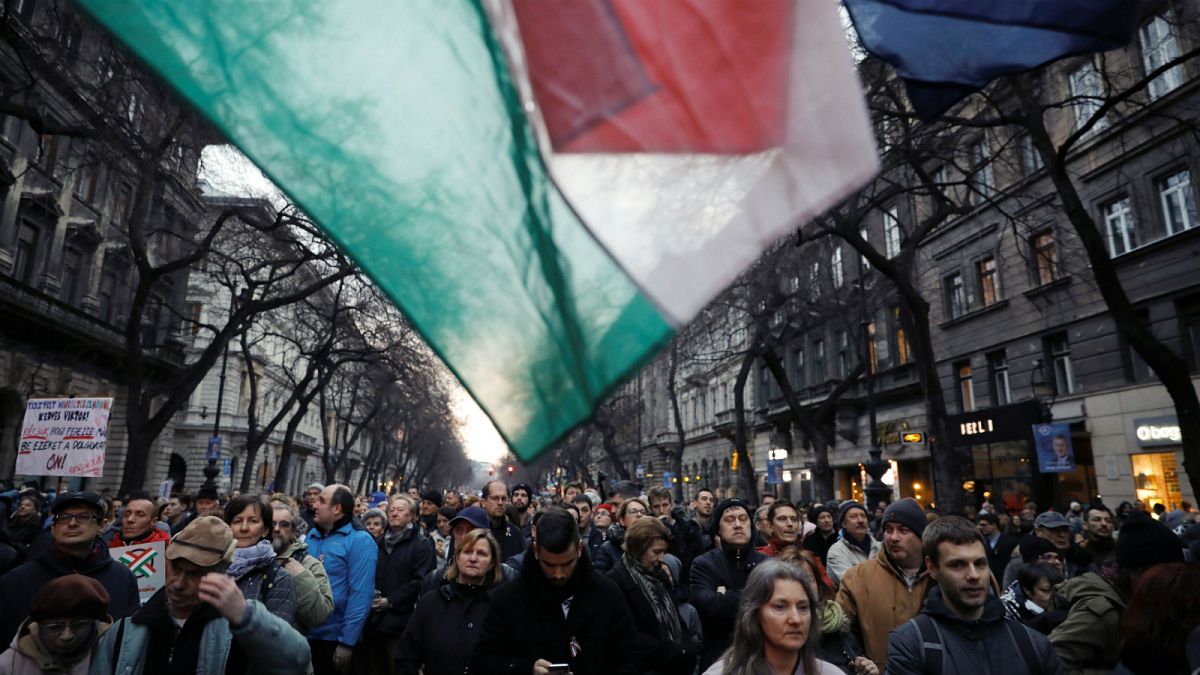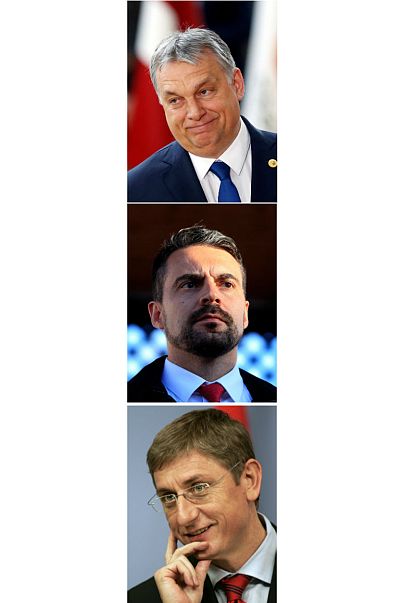Everything you need to know about Hungary's general election and why you should care.
Europe’s leading populist and Brussels' bête noire Viktor Orban is on course for another four-year stint in power.
His right-wing Fidesz party is leading opinion polls ahead of Hungary’s general election on 8 April.
Here is our special guide to everything you need to know about the vote and why it is important for Europe.
Who are the principle parties and personalities?
Fidesz: This is the party led by Orban, which has ruled Hungary in alliance with the Christian Democrats (KDNP) since 2010. Orban, 54, helped found Fidesz in 1988 and had his first stint as the country’s prime minister a decade later.
Jobbik: The far-right movement, which has been branded neo-Nazi and anti-Semitic, won 20 percent of the vote at the latest general election four years ago. The party, which is led by Gabor Vona, has described itself as radically patriotic in the past but experts say there have been efforts to appear more moderate so as to appeal to centrist voters.
Socialists: The Hungarian Socialist Party (MSZP) has evolved from the Hungarian Socialist Workers' Party, the communist party that ruled from 1956 to 1989. It is on the same ticket as the liberal Dialogue (Parbeszed) movement and, like Jobbik, is predicted to win around 15 percent of the vote.
Politics Can Be Different (LMP): This is Hungary’s green party and campaigns on issues like environmental protection, reforming politics and stamping out corruption. It has six out of 199 seats in the parliament.
Others: There is the newly-formed and pro-EU party Momentum; the socially-liberal Democratic Coalition, led by former socialist and ex-prime minister Ferenc Gyurcsány; another pro-Europe party, Together; and the joke Two-tailed Dog party, who put forward a candidate dressed in a full chicken suit and mask.
Why should I care?
Experts say the country is following the Russian or Turkish model by restricting press freedom, weakening democracy and clamping down on foreign-funded NGOs.
If this continues after the election it is likely to mean further clashes with Brussels amid accusations Hungary is taking the EU’s handouts but is not respecting its values on human rights and basic freedoms.
Hungary is also leading Europe’s lurch towards populism: a Euronews study found the proportion of voters — 65% — in the country backing so-called anti-establishment parties was the highest in the EU.
The election is therefore likely to be a sign of how strong Europe’s populist pulse is beating, a month after anti-establishment parties won in Italy.
Yet, while populism is seemingly thriving in Hungary there is still widespread support for the EU, according to the Pew Research Center. Its study in 2017 found 67 percent of Hungarian respondents had a favourable view of Brussels.
The immigration issue
Immigration is a key election topic in Hungary, which was at the heart of Europe’s refugee crisis in 2015.
That year saw 174,435 asylum applications made, with just 425 receiving a positive response from Hungarian authorities.
But the flow of migrants from two years ago has slowed to a trickle.
Last year there were 3,115 requests for asylum, with around a third of them getting the thumbs up, according to Eurostat.
Orban told a rally earlier this month: "External forces and international powers want to force all this [immigration] on us with the help of their henchmen here in Hungary, and they see the coming election as a good opportunity for this.
"[External powers] want to take our country. They want to force us to give it up voluntarily over a few decades to strangers arriving from other continents who do not [...] respect our culture, our laws and our way of life."
Government figures show there were 151,132 foreign citizens living in Hungary last year, or 1.5 percent of the country’s 9.8 million population.
Meanwhile, of the 23,803 people who immigrated to Hungary in 2016, the majority were from Europe (60 percent).
“Orban does his best to make the migration issue the most relevant part of the campaign,” Robert Laszlo, an election expert from Budapest-based think tank Political Capital, told Euronews.
“Fidesz voters have a real fear about migrants and a fear of strangers and they are afraid they will take their jobs and kill the Hungarian and European culture.
“Yet they’ve never seen a migrant - because we don’t have any. They are really afraid of the unknown.
“But this is just a minority of the Hungarians. Orban has two million voters in a population of eight million. Most people can feel this is a lie and just propaganda.”
Orban’s stance on immigration has sparked a row with UN human rights chief Zeid bin Ra’ad al-Hussein, who called him one of “Europe’s racists and xenophobes”. Hungary responded by saying Zeid was unworthy and should resign.
Hungarians, however, appear to have more pressing concerns than immigation.
An Ipsos survey earlier this year found 72 percent of respondents from the country thought healthcare was the most worrying issue. They also ranked corruption, education and unemployment ahead of immigration controls.
Soros squabbling
Orban lays blames for Hungary’s immigration ‘problem’ at the door of philanthropist George Soros.
The Hungarian-born billionaire is accused of allegedly supporting NGOs that push liberal and open-border values.
Earlier this year, Orban’s government introduced draft legislation to ‘Stop Soros’, which includes a 25 percent tax on foreign donations that back illegal migration in Hungary.
Another law targets the Soros-founded Central European University in Budapest.
Laszlo said it was evidence that Orban, who is perceived to be close to Vladimir Putin, is pushing Hungary to become like Russia.
“We can see the way they handle the free press, the way they handle the NGOs and the independent intellectuals and independent universities,” said Laszlo. “We can see it step-by-step following the Russian model.”
Press freedom
Experts say press freedom has seen a sharp decline in recent years, hitting democracy and helping Orban stay in power.
Hungary is ranked as one of the worst countries in the EU for press freedom, with only Bulgaria and Greece worse off.
“I cannot say democracy is dead but it’s a lot weaker than it was a few years ago,” said Laszlo. “ Fidesz politicians and prime minister Orban do not have public debates with opposition politicians.”
“We still have our channels but the direction is very bad. Lots of independent local newspapers, but now [they] are under the control of people around the prime minister.”
Who is likely to win?
Fidesz has a clear lead in opinion polls, followed by far-right party Jobbik and the Hungarian Socialist Party.
Laszlo said a win for Fidesz is the most likely scenario. Critics have said the party changed election boundaries in 2013 to their advantage.
András Bíró-Nagy, political analyst at Policy Solutions, a Hungarian think-tank, said, "It would now take something extraordinary for the Fidesz party not to win the general election."
So how has Orban galvanised support after so long in Hungary?
"Fidesz thrives on a wave of hatred it has fomented in Hungarian society against migrants, liberals and, increasingly, anyone who disagrees with its politics."
"The overall theme of the Hungarian government is that of protection at every level — from ‘Brussels’ and other attempts at ‘foreign domination’; from the ‘George Soros Plan’ and concomitant ‘Muslim invasion of Christian Hungary’; from the multinational corporations; and from ‘domestic enemies’ that seek to ‘undermine’ Hungary.
"Combined with a solid economic performance, including a respectable growth rate — though one of the lowest in a booming region and fuelled by European Union funds — Fidesz appears to be in good position to win the 2018 elections," said Bíró-Nagy to Euronews.
While observers say Orban is not invincible there is not a strong personality on the left to match his charisma. According to Laszlo, the left were also divided and struggling to regain the public’s trust after former socialist prime minister Ferenc Gyurcsany admitted lying about the state of the economy to win elections.
Opposition figures are pinning their hopes on a recent local government by-election result in Hodmezovasarhely, a stronghold for Fidesz. But the party’s nominee lost out in the mayoral race to an independent candidate backed by opposition parties.
There is also concern that fake parties — set up solely to benefit from state subsidies for election campaigning — will take away votes from genuine political movements.

